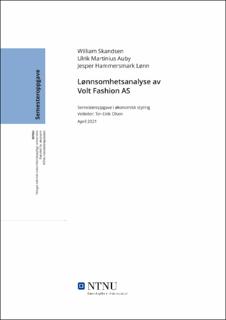Lønnsomhetsanalyse av Volt Fashion AS
Bachelor thesis
Permanent lenke
https://hdl.handle.net/11250/2777282Utgivelsesdato
2021Metadata
Vis full innførselSamlinger
- NTNU Handelshøyskolen [1623]
Sammendrag
Semesteroppgaven her er skrevet som en del av vår bachelorgrad i Økonomi og Administrasjon på NTNU Handelshøyskolen i Trondheim med hovedprofil i økonomisk styring. Oppgaven baserer seg på en lønnsomhetsanalyse av Volt Fashion AS og analysen tar utgangspunktet i regnskapsårene 2015-2019. For å undersøke utviklingen i dybden har vi også supplert med en strategisk analyse av selskapet i form av en SWOT-analyse. Oppgaven er utarbeidet på bakgrunn av regnskapstall for perioden og informasjon om selskapet fra ansatte i Volt.
Innledningsvis setter oppgaven søkelys på selskapet og problemstillingen som vi har valgt. Deretter presenteres relevant teori som danner grunnlaget for å kunne gjennomføre en analyse av regnskapstallene til Volt. Teorien omhandler likviditet, soliditet, finansiering og lønnsomhet, samt teori i tilknytning til SWOT. Videre redegjør vi for forskningsmetoden og drøfter hvilke konsekvenser våre metodiske valg har hatt for oppgavens reliabilitet og validitet. Analysen av regnskapstallene følger så, der vi har gjennomført en horisontal nøkkeltallsanalyse til selskapet, samt en SWOT-analyse. I tillegg følger en benchmarkingsdel hvor vi sammenligner utviklingen i lønnsomheten til Volt med Voice Norge AS, som er et lignende selskap i samme bransje.
Til slutt presenteres en konklusjon som svarer på problemstillingen vår. Vi ser at lønnsomheten til Volt har forverret seg kraftig i perioden, og at dette i stor grad skyldes en utsatt klesbransje. Sammenligningen med Voice underbygger denne konklusjonen. Som et resultat av den SWOT-analysen virker det strategisk hensiktsmessig for Volt å ha et større fokus på miljø og bærekraft i fremtiden, fordi kundene har et stort fokus på disse områdene i dag. Videre må også Volt være forberedt på at netthandelen er en trussel, og det vil følgelig være viktig å henge med på denne utviklingen i markedet. This term paper is written as a part of our bachelor’s degree in Business Administration with respect to our main profile, Management Accounting and Control. The assignment is based on a profitability analysis of Volt Fashion AS with regards to the period 2015-2019. To examine the topic in a complete perspective, we performed a strategic analysis as well in form of a SWOT analysis. The paper is based on the key financial figures of the company and information from employees of Volt.
Incipiently, the assignment focuses on the company and the research question we have chosen. Furthermore, we present theory of relevance which forms the basis of this paper. The theoretical framework draws on key financial figures within liquidity, solidity, financing and profitability, as well as the strategic framework, SWOT. Then, we present our research methodology where we discuss the implications of our choices on validity and reliability. The analysis is then presented where we point out the results of our profitability and horizontal key figure analysis. In addition, we present our SWOT analysis and a benchmarking part where we compare the development of Volt’s profitability to Voice Norge AS, which is a similar company in the same industry.
Finally, we present a conclusion to our paper. Our analysis shows a clear negative trend in the profitability of Volt. The benchmarking with Voice indicates that the reason for this is that the clothing industry is suffering. As a result of the SWOT analysis, it seems reasonable for Volt to have a greater focus on environment and sustainability in the future. This is due to the rising awareness on these topics among Volt’s customers. In addition to this, online shopping is trending, and it is therefore important for Volt to facilitate online shopping to their customers, such that the company can compete in the digital future.
